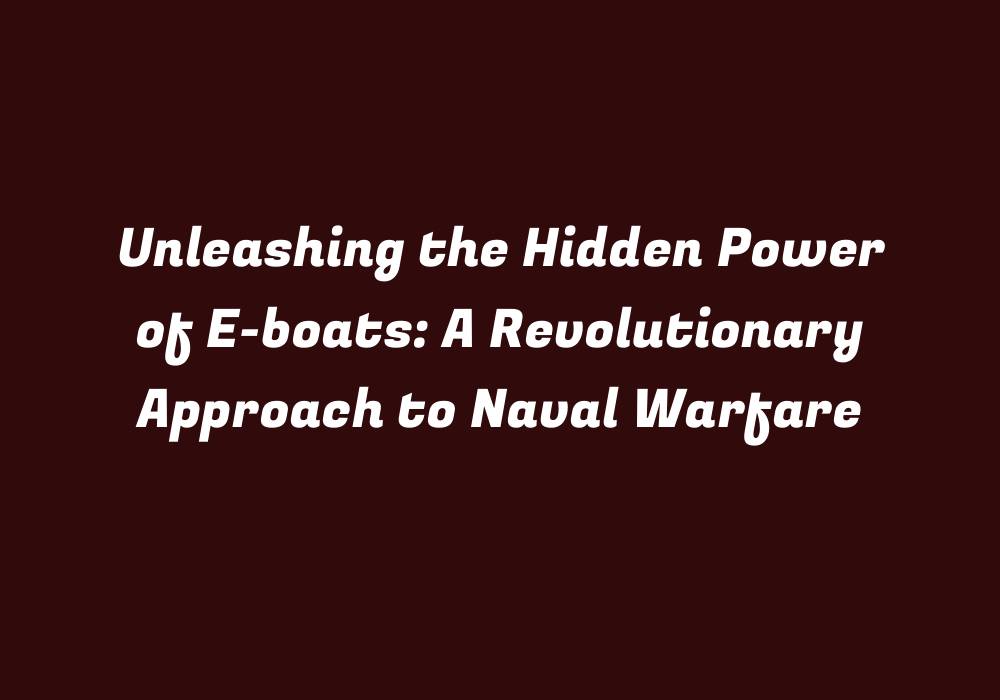Unleashing the Hidden Power of E-boats: A Revolutionary Approach to Naval Warfare
Introduction: The rapid advancements in technology have significantly transformed naval warfare. As nations continue to develop sophisticated weaponry, a new type of vessel has emerged that may soon revolutionize the way we fight at sea – the E-boat. With its unique capabilities and potential benefits, these electric vessels are set to redefine maritime conflict.
The E-boat Concept
Electric Boats: E-boats represent a new generation of naval vessels that operate with an emphasis on electrical power and propulsion. These environmentally friendly, quieter options are powered by advanced batteries, which in turn harness energy from renewable sources or other sustainable methods. This concept has the potential to significantly impact various aspects of modern warfare.
Advantages of E-boats
Stealth Capabilities: One crucial aspect that distinguishes E-boats from traditional naval vessels is their inherent stealth capability. Being electrically powered, they produce much less noise and generate no emissions. As a result, these vessels can operate without being detected by opponents’ sonar systems or radar surveillance. This enhanced stealth factor offers an edge to naval forces in a range of potential combat situations.
Eco-friendly Approach
Environmental Benefits: The increasing concern for environmental preservation has led to the development of eco-friendly technologies in various sectors, and naval warfare is no exception. By utilizing sustainable energy sources, E-boats significantly reduce their carbon footprint while at sea, thus contributing positively to marine ecosystems. In turn, this approach reflects a responsible attitude towards environmental protection, an aspect that may become increasingly important for future naval operations.
Increased Operational Autonomy
Extended Range and Endurance: E-boats can travel long distances due to their low energy consumption, allowing them to operate independently for extended periods without the need for refueling. This increased operational autonomy significantly improves mission effectiveness by reducing dependence on resupply vessels or bases, as well as mitigating the risk of being detected during fuel transfers.
Cost-effectiveness
Reduced Maintenance and Operational Costs: Aside from their environmental benefits, E-boats demonstrate a notable cost-saving potential. Traditional naval vessels require ongoing maintenance for their engines, propulsion systems, and other mechanical components, all of which can be eliminated in the case of E-boats due to the use of electric power. Additionally, reduced fuel costs associated with electricity further contribute to the overall affordability of these vessels.
Application in Modern Naval Warfare
Enhanced Intelligence Gathering: E-boats can be deployed for various intelligence gathering missions, such as reconnaissance and surveillance. Their stealthy nature allows them to operate undetected while collecting valuable information about potential adversaries. This capability may prove crucial in providing tactical advantage during times of conflict.
Versatile Use for Multiple Missions
Diversity in Mission Capabilities: E-boats are capable of undertaking a wide range of missions, ranging from combat to humanitarian assistance and disaster relief. Their adaptability to different scenarios makes them highly valuable assets in modern naval warfare, where the ability to respond rapidly and effectively to various situations is paramount.
Conclusion
Embracing the E-boat Revolution: As we enter an era of rapid technological advancements and increasing environmental awareness, it becomes evident that the time has come for naval forces to embrace the potential of E-boats. These revolutionary vessels have the ability to transform traditional naval warfare by providing unprecedented stealth capabilities, eco-friendly operations, enhanced mission flexibility, and cost savings. As nations worldwide continue to invest in their maritime defense, the E-boat concept stands poised to reshape the future of naval warfare as we know it.
In a world where environmental protection is an increasingly pressing concern, the eco-friendly nature of these vessels further emphasizes their importance and relevance in the coming years. As the maritime landscape evolves with technological innovations and emerging threats, E-boats offer an opportunity to redefine our approach to naval warfare – a transition that promises to have lasting implications on global security and environmental preservation.
